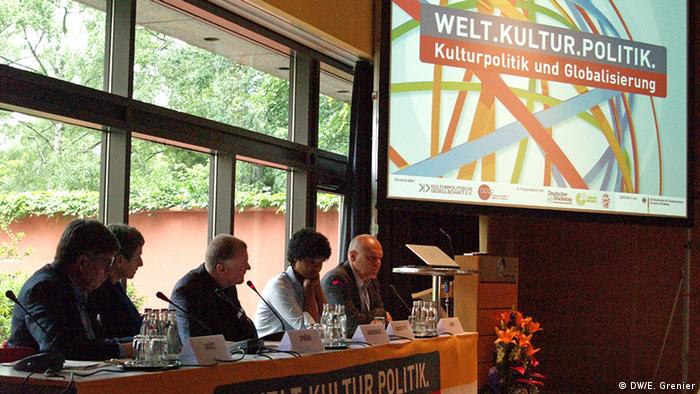“The West disappears,” postulated by the Indian writer Pankaj Mishra on 9. Cultural Policy Of The Federal Congress. One of the many challenges, the culture-makers in Berlin and discussed.

“World. Culture. Policy” was the Motto of the 9. Cultural policy of the Federal Congress in Berlin, the cultural political society, and of the Federal centre for political education from the 15.-16. July will be held. At this year’s Event, the consequences of globalization for culture and cultural policy at the centre. The event is a platform for those interested in cultural policy and management, as well as cultural managers and aims to stimulate: for the exchange of foreign cultures in a society that is culturally more and more heterogeneous.
The “West”: an outdated concept?
“The West no longer exists,” said the Indian writer Pankaj Mishra in terms of the “crazy adventure Brexit”, and the choice of Donald trump as US President. In his speech at the opening of the Congress was “Cultural world views”. The “West”, the London-based author, is a concept that, over time, anyway, have changed, and now the term is “to lose is becoming increasingly important.”

Historian and journalist Pankaj Mishra
Germany, Mishra, recalled in the late 19th century. Century had a Vision. The “West” had been a Structure, in France, the UK and the USA included. This world view is also reflected in the case of Thomas Mann, the writer, in the 1930s, to a large critic of the Nazis: In his 1918 book, “reflections of an Unpolitical” was he, that the English liberalism and the French enlightenment with the values of Germany, were compatible.
The industrial Revolution reached Germany later than in the UK, said Mishra. Modern history has been designed especially of countries which were early to industrialize, he said, and added that it was helpful to consider the process from the point of view of the countries that came late – so to speak, the “loser” of the story. The historical aspects behind the current international crisis, lit Mishra in his latest book, “The Age of Anger”.

A new look at the story: “Age of Anger” by Pankaj Miashra
Neo-liberal fantasies give up
The principle of anglo-American liberalism continues to shape the economic and cultural policy decisions, and has been strengthened by the fall of the Berlin wall, Mishra. The Credo: let free markets flourish worldwide, releases entrepreneurial energies and the corresponding economic growth will automatically lead to the population demanding democracy and the rule of law.
Mishra compares this approach with the Marxist theory, which postulates that the working class of the day will be so disillusioned that she wanted to overthrow the bourgeoisie.
“We need to let these ideas and assumptions that we impose on the Rest of the world behind us,” asks the Essayist to the cultural policy of the Federal Congress. These views are so deeply embedded that it is difficult to solve, he added. “Even in times in which a Madman in the White house ruled.”
Interwoven story instead of winners and losers
Léontine Meijer-van Mensch, program Director of the Jewish Museum in Berlin, warned, to write a story of winners and losers, and deepening the trenches. “Such categories are not clear-cut,” says Meijer van Mensch. It would be better to speak of “interwoven history”.
You try, for example, to bypass unifying definitions of Jews, arriving in Germany often the “victim”-drawer. The plurality of the Jewish community, so that an “Orthodox Rabbi and a lesbian Jewish activist” can have topics of conversation.
Focus on common experiences

Léontine Meijer-van Mensch is since 2017 program Director of the Jewish Museum Berlin
New perspectives for museums, Lavinia Frey, Executive Director of the Humboldt Forum cultural GmbH would like to develop. The abgenutze concept of “Dialogue” is not very helpful, Mishra, Meijer, van Mensch and Frey agreed: Often he would be accompanied by a condescending attitude, with which one side attempts, the other your opinion on.
It attempts, rather, cross-border “common experiences”, said Frey and referred to the exhibition “Watch Out, Children,” in the Humboldt Box exhibition building, the on 7. July opened. The Exhibition aims to show how parents around the world have always been trying to protect their children.
The Jewish Museum is currently showing the exhibition, “Cherchez la femme” with headlines and swimwear, headscarves, and demonstrations, fashion shows and audiences with the Pope. She asks: How much religiosity secular societies tolerate?
Cultural institutions in the spotlight

“With collaborations and co-productions”: German cultural policy today
In the German cultural exchange of dialogue as the Central Element, however, is retained, often repeated by the Goethe-Institut Secretary General Johannes Ebert. “New challenges” for cultural mediators, a panel discussion on Friday with Ebert, Ronald Grätz (Secretary General of the ifa Institute for foreign cultural relations), Susanne Spröer (head of culture Online, Deutsche Welle) and Nana Adusei Poku (Professor for visual cultures at the Piet Zwart Institute of the Willem de Kooning Academy).
In Germany there was recently a change of paradigm, not meant Grätz: the Case of cultural initiatives of the state play the main role, but civil society. While it is more complex and elaborate, but his Institute have been working more “with collaborations and co-productions,” explains the Secretary-General.
Sometimes, crises could be predicted, but most of the time, you would be for creators of culture, but, surprisingly, such as the choice of Trumps or Brexit, as Grätz. In order for cultural institutions to arrive then clear.
Lack Of Diversity
Trump’s choice was a “Wake-up” Moment, Adusei Poku, but the Professor sees the real Problem in the case of the institutes, which “would not have made many years of their work”. Sharply criticized the German cultural Institute for their handling of gender diversity: “Who is represented in the institutions? The plurality is constantly marginalized.”
Justified criticism, as the panelists agreed, but also underlined that it would worked to improve the Situation. “Plurality is never to be good enough represents,” says Grätz, and admitted, a total Neufindung is difficult for international institutions. “By the end of the year, we can’t make it.”